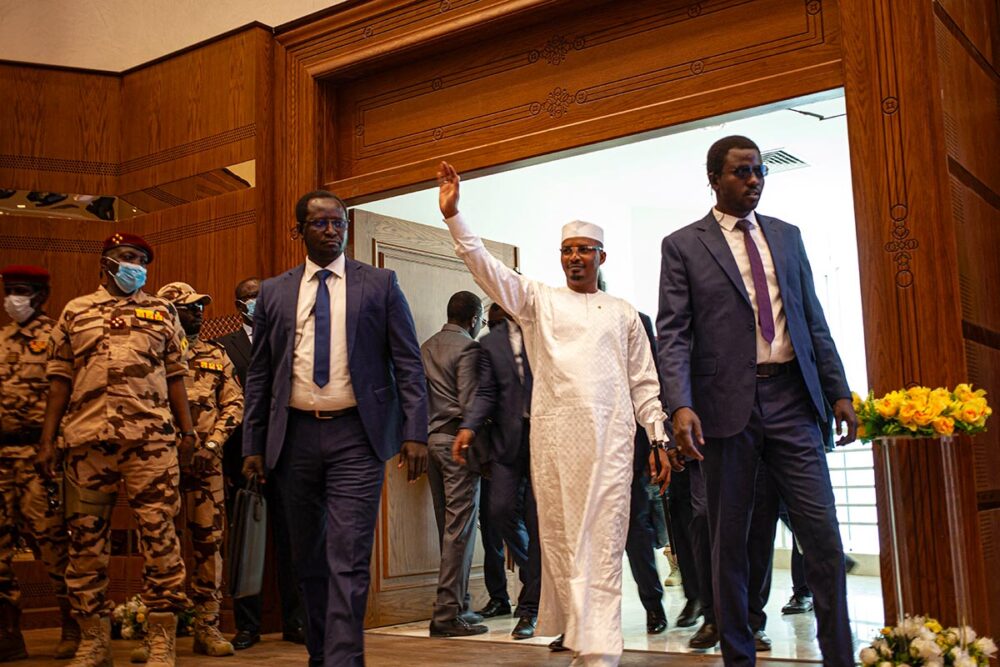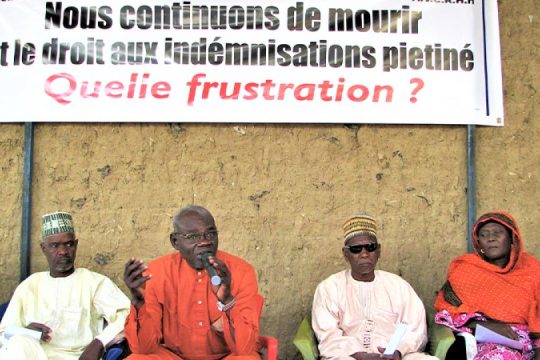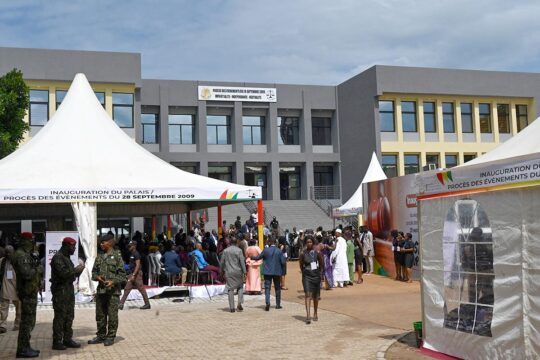Dozens of people wait under hot metal sheeting in the small courtyard before the building of the Association of Victims of Hissène Habré's Crimes (AVCHH) in a central district of the Chadian capital N'Djamena. Mahamat Babikir crouches against the wall of the association's headquarters, where it casts a bit of shade. He has been waiting for an hour, despite the 45-degree heat.
“My family is on the list, here's the document. We're just waiting for them to call the right people,” he says. His parents were imprisoned during the regime of Hissène Habré, who ruled Chad from 1982 to 1990. So like thousands of Chadians, he is eligible for financial aid promised after the former leader’s trial. But no one knows when the compensation will be paid. The crowd waits under the sun. Some grumble, others try to grab an official.
Suddenly the association’s president, Adoumbaye Dam Pierre, emerges from his office, preceded by three Chadian army bodyguards, and gets into his vehicle: an appointment awaits him. An old man knocks on the window: “I've come from the south of the country to collect the compensation. I've been waiting in N'Djamena for a month. You've got to do something, Mr. President!” The association president asks why he didn't stay at home, assuring him that the commissions responsible for paying out compensation would be visiting the provinces. He asks him to go back. But at the insistence of the man, whose face is dripping with sweat, he gives this man the mobile number of an official.
This scene, witnessed on Friday April 5, reflects the slow and tedious process of obtaining financial compensation for the victims of Habré’s regime.
Eight years without compensation
Two sentences -- in N'Djamena in 2015 of 24 former agents of Habré’s political police, and in Dakar in 2016 of Hissène Habré -- provided for the payment of compensation to his victims: 82 billion CFA francs to be paid by the former president, and 75 billion by his former agents, i.e. a total of 157 billion CFA francs (around 240 million euros).
Activists, lawyers and victims’ associations waited a long time for the decision to be implemented. “After Habré's trial and conviction, the joy didn’t last long,” explains Clément Abaïfouta, who was arrested by Habré’s political police in 1985 and forced to work as a gravedigger during his detention. “We waited and asked, but nothing came.”
The Court of Appeal of the Extraordinary African Chambers in Dakar, the special court backed by the African Union (AU) which convicted Habré, had planned to set up a “victims’ compensation fund”, modelled on the existing Trust Fund for Victims at the International Criminal Court (ICC). According to Delphine Djiraïbe, one of the victims’ lawyers, this fund was to organize compensation for the victims.
But nothing went according to plan. The fund was never really set up, and Habré (the “lion of Chad”) died without his assets having been sold. Abaïfouta, who sits on the fund’s board of directors, asserts that he and the other members “went around the world lobbying for compensation funds, convincing everyone to participate. Many were ready, but everyone was waiting for Chad to act”.
After the Dakar trial, an initial contribution from the AU was paid into the fund's bank account, together with the balance of unused money from the trial, for a total of less than 10 billion CFA francs, say the lawyers and Abaïfouta. They hoped to get other countries and international organizations to contribute to the reparations once Chad had made its contribution.
Not the right procedure
Nothing happened for eight years. Chad paid not a single franc into the fund’s account. In early 2024, Chad's transitional president Mahamat Idriss Déby, son of former president Idriss Déby Itno who died in 2021, decided to step up the pace. After meeting with victims’ associations on February 22, he decided that “Chad will pay its share”, and announced the payment of 10 billion CFA francs to victims, or just over 15 million euros.
This was a relief for the victims. They will now be compensated, but not according to the right procedure, regrets Djiraïbe, who speaks of a “coup de théâtre which we learned about on the airwaves”. This is because the money will be paid directly, and not via the dedicated fund. “If Chad wanted to put money in, it should have been put in the dedicated fund for proper distribution, but that's obviously not the case here,” she adds.
Abaïfouta agrees: “It's all becoming farcical. The president's approach of wanting to pay the money to the victims is to be welcomed,” he says, but “it's not the right approach”. “Has he been badly advised?” Abaïfouta asks.
Only 6% of expected reparations
Out of a total of 157 billion CFA francs in compensation awarded by the courts in the two trials, the Chadian government’s share should be higher. Indeed, the 10 billion announced by the Chadian President represents only 6.3% of the reparations awarded in N’Djamena and Dakar.
But assembling such a sum is already a headache for Chad, a country under assistance from the International Monetary Fund, with a high risk of over-indebtedness. It is also dependent on foreign aid, notably recent and substantial aid from the United Arab Emirates. Relations between N'Djamena and Abu Dhabi are very good indeed: the Chadian President recently visited the Emirates at the invitation of his Emirati counterpart Sheikh Mohamed Bin Zayed Al Nahyan.
The compensation process is steered by the Chadian Ministry of Finance, explains Dam Pierre of AVCHH which is responsible, along with other associations, for making the payments in liaison with the authorities. “They took the Dakar decision and worked on the lists [of victims] from the trial,” he explains. “This payment will still bring some relief to the victims, some of whom are dying and getting old.” According to him, a total of 10,700 victims have been identified, and “the ministry has cut the cake fairly: each will receive 925,241 francs (CFA)”, or around 1,400 euros.
Victims dying
But what about the “victims’ compensation fund” set up by the Extraordinary African Chambers in Dakar? “They never came to N'Djamena,” says an exasperated Dam Pierre. “When we met President [Déby] in February, we told him we had to stop the bleeding, that victims were dying and had received nothing, and he heard our appeal.”
In particular, he argues, the decision was taken by the National Sovereign and Inclusive Dialogue (DNIS), which took place in Chad in 2022 and officially “designated” General Mahamat Idriss Déby Itno as president. Among other recommendations, the DNIS urged the new president to “execute court rulings on compensation for victims of the regime of former president Hissène Habré” and examine “modalities for the repatriation of the remains” of the latter, who died in Senegal in 2021.
A refugee in Senegal after being ousted from power in 1990, Habré was arrested, charged, tried, convicted of crimes against humanity (rape, executions, slavery and kidnapping) and sentenced to life imprisonment. He served his sentence in Senegal, where he succumbed to Covid-19 in August 2021, at the age of 79, and was buried there.
“It's now up to the other players,” says Dam Pierre, “to do their part and pay up.” But, wonders Abaïfouta, will this be the case now that Chad is paying compensation outside the dedicated fund? “To make the right corrections, you need the right corrector", he says, meaning in his view the ad hoc fund.
Repatriating Habré's remains?
Payments, which began in March, are proceeding at a snail's pace in the April heat, and are likely to continue for several more weeks, while Chadians go to the polls on May 6 to elect their next president. This presidential election will mark the end of the political transition begun after the death of President Idriss Déby Itno.
“Habré's family is still very present in Chadian politics, they have influence, they are pushing for his remains to be returned and for us to stop all this talk of compensation, and the Palace doesn't want to alienate them,” says an executive from a political party supporting the ruling MPS, speaking on condition of anonymity.
Gondeu Ladiba, an anthropologist at the University of N'Djamena, notes that “this compensation issue has become very political”. “The regime needed to be able to say that the son is not the father, and that the current president wants to purge the past so as to be able to start on a new footing, including with those close to Hissène Habré.” He thinks the payment of 10 billion CFA francs is a way for N’Djamena to “turn the page on compensation” and open the door to the return of Habré's remains.
“There is no question that this payment will mark the end of the story for the victims,” insists Abaïfouta, who has since become a deputy on the National Transition Council. “This trial, these victims, are my whole life. I can't have worked for 33 years for it to end like this, for all our efforts to result in nothing.” And he promises that he will continue to fight so that finally the victims receive the money that is due to them, in full.






